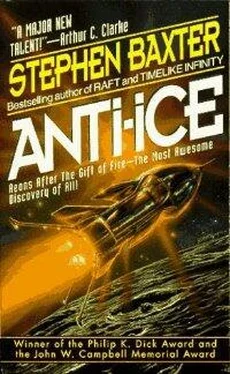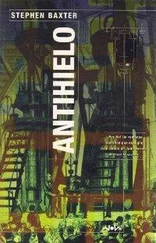Traveller took another bite of toast. “What alternative do you propose?”
I thumped my fist into my palm. “That we abandon this game of normality; that we sit down and discuss ways of wresting back control of this vessel from the deranged Hun who has occupied the Bridge.”
Holden said, “Ned—”
But Traveller nodded. “We will converse on any subject you nominate,” he said with a rasp. “But, sir, you will allow me to finish my breakfast in good order.”
I spluttered, “Breakfast? How can you swallow toast in a situation unparalleled in the experience of man—when, indeed, our very lives are at peril…”
I continued in this vein at some length, but the old gentleman would have none of it; and I was forced to subside, fuming, and wait until breakfast was over and cleared away.
Traveller, utterly composed, wiped his long fingers on a napkin.
“Now then, Ned, I sympathize with your sentiments, and even admire your resolve which, while founded on ignorance and hotheadedness, nevertheless contains elements of courage. However, Ned, you are not as stupid as you appear, and you know very well that the connecting hatchway between this compartment and the Bridge is jammed from above. And we are bereft of tools by means of which we might effect a forced entry.”
I found myself grinding my teeth together. “And your conclusion?”
“That there is nothing we can do to improve our prospects—although there are many actions we can take which would make things worse.”
Holden had blanched, but steepled his fat fingers together in a composed manner. “Then what do you recommend?”
“We must accept that which we cannot change. We must hope that our Teutonic pilot sees fit to reverse the course of this vessel—if indeed he can. Then we must pray that the craft retains the ability to return us safely to our native world.”
I leapt from my chair and cannonaded from the padded ceiling. “Hope? Pray? You counsel us with inactivity, Sir Josiah. Will you continue to press this advice when the marmalade supply dwindles to naught?”
Traveller barked laughter.
I said, “I for one am not prepared to face my death without a fight.”
Holden sat straighter in his chair and faced me grimly. “I hope you will face your death with resolution, as an Englishman should, Ned.”
That evoked a sunburst of shame inside my anger, but I went on regardless: “Holden, there is nothing English about lying down to die.”
Traveller rested his hands on his lap. “Gentlemen, it can certainly do no harm to talk. Provided,” he said to me severely, “we conduct our conversation in a civilized fashion.”
I climbed back into my chair; but my fingers danced restlessly on the chair’s arms throughout the ensuing discussion.
“So,” said Traveller, “what would you like to talk about, Ned?”
“It’s obvious. We must find a way to open that hatch to the Bridge.”
“And I have already explained that such a course of action is impossible. What else do you suggest?”
Baffled and angry, I looked to Holden, who said smoothly, “Sir Josiah, I fear that without the advantage of your deep knowledge of the Phaeton and its construction, young Ned is likely to lack ideas. Perhaps we could explore the nature of the craft’s design, in the hope of some notion evolving. For example, how thick are these walls?”
Traveller’s eyebrows rose. “The walls? Perhaps, you speculate, a heroic figure could slip between the inner and outer hulls, slither like a ferret up to the Bridge, and burst upon our German friend? Alas, the space between the hulls is only nine inches deep—a little too narrow even for our young companion, let alone one with such ample girth as yours—and in any event is occupied by pipes for heating, water and air, by springs which cushion the inner compartment from impact—the inner chamber is gimballed, you know—and the various beds, chairs and other devices of which you both make such extensive use. And anyway the double hull terminates at the joint with the Bridge; the Bridge and Smoking Cabin are separate, airtight compartments.
“To save you time, let me say that the only access to the Bridge—other than the blocked hatch above us—is through the hatch set in the Bridge’s outer glass wall. And that, of course, could only be opened were one positioned outside the vessel.”
Holden shook his head. “I cannot understand how you allowed a design in which access to the vessel’s controls can be blocked so easily!”
Sir Josiah smiled. “In my youthful naпvety, I did not anticipate sabotage. I never envisaged the situation which pertains today.”
Traveller’s use of the word “airtight” had given me an idea. “Sir, where is the air supply which feeds the Bridge?”
“Bridge and Smoking Cabin are both fed by the same network of air pipes, which climb through the hull from pumps and filter sets in the Engine Chamber beneath our feet.”
I nodded. “To which we have access.”
“Ned, what’s in your mind?” Holden asked.
“Suppose we were to block the air pipes which feed the Bridge? Then our Hunnish companion would surely expire in his own stink within a few hours.”
Traveller nodded gravely. “Elegantly put. But while such a course of action would be satisfyingly vengeful, I fear it would leave us only worse off. We would still have no access to the Bridge, and would have replaced a German pilot with a dead one!”
The engineer’s calm, condescending dissection of my proposals, all delivered in the flat, nasal tones of the Mancunian, enraged me. “Then let us continue,” I said, endeavoring to keep my voice steady. “The air pumps lie within the Engine Chamber. What else is to be found there?”
“You can see for yourself,” said Traveller. “Pocket, would you raise the maintenance covers?”
The patient servant, with scarcely a nod, pushed himself from his seat and floated down toward the floor. There he tugged at the Turkish rug and oilskin which covered the bulkhead; the carpets were affixed by hooks and eyes which disengaged readily enough, but the poor man had a deal of trouble rolling up the loosened carpets in our floating condition. Pocket steadily refused all our offers of help, the only request he made of us being to raise our feet from time to time.
I never knew a man who knew his place so well, and filled it to such perfection.
At last the carpets were rolled up and stuffed into a crevice near the top of the Cabin wall. The bulkhead so revealed bore the sheen of aluminum, but it was not a solid slab; instead the bulkhead, some fifteen feet wide, was little more than a framework into which great holes had been cut, and these holes were covered by large rectangular plates held in place by wingnuts. One portion of the bulkhead was covered by overlapping sheets of rubber; this, I recalled, concealed the enclosed bath we used daily.
Now Traveller braced his feet against the ridged aluminum surface and twisted away the wingnuts restraining one of the plates. He stored the nuts neatly in a row—in thin air—while he worked, finally stowing them in a waistcoat pocket. “You need not fear a loss of air,” he said. “This bulkhead is not airtight, and the lower compartment is held at the same pressure as the Cabin.”
Holden and I peered inside the hole. The compartment revealed was some seven feet deep, and directly below the hole was a sphere perhaps four feet in diameter, held in place by a stout framework; this sphere was coated with silver plate, so that our reflections, and those of the acetylene lamps above and behind us, danced in its curving belly. This, Traveller explained, was one of the Phaeton’s three anti-ice Dewar flasks. I considered the flask with something approaching awe, and I touched its silvered epidermis. But I felt only a smooth, pleasantly warm surface; there was no hint of the layer of vacuum which lay beneath the vessel’s outer shell, nor of the handful of primordial violence which lay at its heart.
Читать дальше












